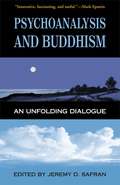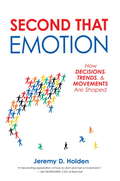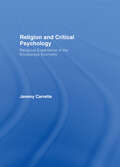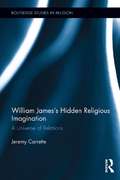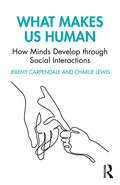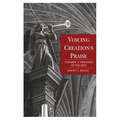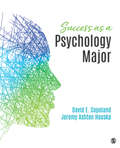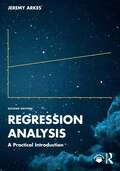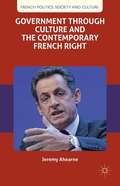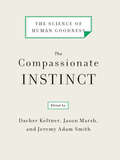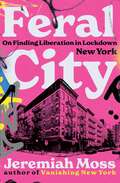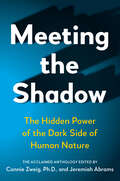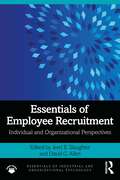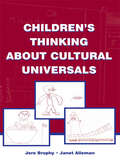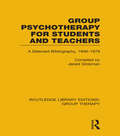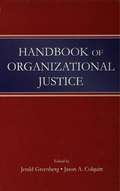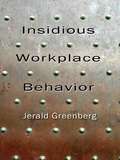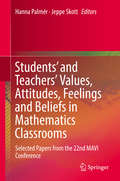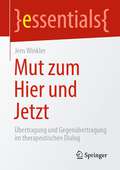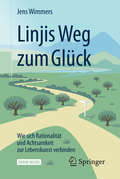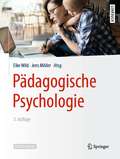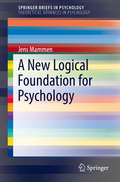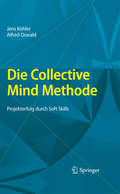- Table View
- List View
Psychoanalysis and Buddhism
by Jeremy D. Safran"What a wonderful book! Jeremy Safran has assembled an absolutely stellar group of writers and has himself contributed an illuminating introduction. The essays are riveting and the book is the rare edited collection with real thematic unity. If you think you might have an interest in the intersection of psychoanalysis and Buddhism, this is the place to start. If you already know you're interested, once you look at the table of contents you'll find (at least I did) that you want to let Psychoanalysis and Buddhism displace whatever you were going to read next."--Donnel B. Stern, PhD, author of Unformulated Experience and editor of Contemporary Psychoanalysis
Second That Emotion
by Jeremy D. HoldenFor businesspeople who want to see their company or brand break through, this book is both essential and entertaining reading. For the rest of us, the author provides a window into our decision-making processes, and how emotion-based illogical leaps drive our support for movements, whether they are political, commercial, or related to popular culture. Why do more than 30 percent of Americans believe President Obama is a Muslim? Why do most fans who supported Dove®'s "campaign for real beauty" feel comfortable ignoring the fact that the brand's parent company, Unilever, was also behind the Axe® campaign, a brand that has blatantly stereotyped women? Why is Yoko Ono still held responsible for the breakup of the Beatles? These and other random, yet related, questions are explained in here. An advertising and communications expert traces the fascinating process whereby a passion for an idea, a politician, a celebrity, or a brand gives rise to a set of illogical beliefs that becomes the basis for a powerful movement. Conventional wisdom has it that spin doctors and Madison Avenue are responsible for manipulating our thoughts, causing us to endorse ideas or buy products that we would otherwise reject outright. Holden shows that while advertising and propaganda can provide a spark and social media provides the kindling, individuals create consumer, political, and cultural trends based, more often than not, on thinking that they know logically to be flawed.
Religion and Critical Psychology: Religious Experience in the Knowledge Economy
by Jeremy CarretteJeremy Carrette argues that the psychology of religion is no longer sustainable without a social critique, and that as William James predicted, the project of the modernist psychology of religion has failed. Controversially he champions greater social and philosophical analysis within the field to challenge the political naivety and disciplinary illusions of the traditional approaches to psychology of religion. Carrette discusses the relevance of the social and economic factors surrounding the debates of psychology and religion, through three critical examples: psychoanalysis humanistic psychology cognitive neuroscience. A Critical Psychology of Religion provides a new dimension to the debates surrounding religious experience. It will be of interest to students and researchers in the fields of critical psychology, religious experience and the psychology of religion and extends an interdisciplinary challenge to the separation of psychology, sociology, politics, economics and religion.
William James's Hidden Religious Imagination: A Universe of Relations (Routledge Studies in Religion)
by Jeremy CarretteThis book offers a radical new reading of William James’s work on the idea of ‘religion.’ Moving beyond previous psychological and philosophical interpretations, it uncovers a dynamic, imaginative, and critical use of the category of religion. This work argues that we can only fully understand James’s work on religion by returning to the ground of his metaphysics of relations and by incorporating literary and historical themes. Author Jeremy Carette develops original perspectives on the influence of James’s father and Calvinism, on the place of the body and sex in James, on the significance of George Eliot’s novels, and Herbert Spencer’s ‘unknown,’ revealing a social and political discourse of civil religion and republicanism and a poetic imagination at the heart of James understanding of religion. These diverse themes are brought together through a post-structural sensitivity and a recovery of the importance of the French philosopher Charles Renouvier to James’s work. This study pushes new boundaries in Jamesian scholarship by reading James with pluralism and from the French tradition. It will be a benchmark text in the reshaping of James and the nineteenth-century foundations of the modern study of ‘religion.’
What Makes Us Human: How Minds Develop through Social Interactions
by Charlie Lewis Jeremy Carpendale"How do you go from a bunch of cells to something that can think?" This question, asked by the 9-year-old son of one of the authors, speaks to a puzzle that lies at the heart of this book. How are we as humans able to explore such questions about our own origins, the workings of our mind, and more? In this fascinating volume, developmental psychologists Jeremy Carpendale and Charlie Lewis delve into how such human capacities for reflection and self-awareness pinpoint a crucial facet of human intelligence that sets us apart from closely related species and artificial intelligence. Richly illustrated with examples, including questions and anecdotes from their own children, they bring theories and research on children’s development alive. The accessible prose shepherds readers through scientific and philosophical debates, translating complex theories and concepts for psychologists and non-psychologists alike. What Makes Us Human is a compelling introduction to current debates about the processes through which minds are constructed within relationships. Challenging claims that aspects of thinking are inborn, Jeremy Carpendale and Charlie Lewis provide a relationally grounded way of understanding human development by showing how the uniquely human capacities of language, thinking, and morality develop in children through social processes. They explain the emergence of communication within the rich network of relationships in which babies develop. Language is an extension of this earlier communication, gradually also becoming a tool for thinking that can be applied to understanding others and morality. Learning more about the development of what is right in front of us, such as babies’ actions developing into communicative gestures, leads to both greater appreciation of the children in our lives and a grasp of what makes us human. This book will be of interest to anyone curious about the nature of language, thinking, and morality, including students, parents, teachers, and professionals working with children.
Voicing Creation's Praise: Towards a Theology of the Arts
by Jeremy BegbieBegbie's unique background as a classically-trained musician and Cambridge theologian gives him wonderful insight and Spirit-led authority in dealing with this critical cultural topic. Moreover, Begbie breaks free of the Modernist stranglehold on aesthetic philosophy, and presents a refreshing and deeply Christocentric analysis of the relationship between the character and action of God and human creativity.
Success as a Psychology Major
by David E. Copeland Jeremy Ashton HouskaSuccess as a Psychology Major, First Edition by David E. Copeland and Jeremy A. Houska is an essential resource for any student interested in pursuing an undergraduate degree in psychology. Built from the ground up with input from hundreds of psychology students, this First Edition answers every question a trepidatious undergraduate may have. Success as a Psychology Major opens with practical tools on how to be a successful student, walks readers through the psychology curriculum, highlights key skills to develop, and presents the various academic and career paths to take after graduation. Unique chapters on joining a research lab, professional organizations and clubs, documenting students' accomplishments, and practical tools for managing time and money provide students with resources they will use throughout their academic career. Presented in a modular format with a student-friendly narrative, this text is a step-by-step road map to a fulfilling and meaningful experience as a student of psychology.
Success as a Psychology Major
by David E. Copeland Jeremy Ashton HouskaSuccess as a Psychology Major, First Edition by David E. Copeland and Jeremy A. Houska is an essential resource for any student interested in pursuing an undergraduate degree in psychology. Built from the ground up with input from hundreds of psychology students, this First Edition answers every question a trepidatious undergraduate may have. Success as a Psychology Major opens with practical tools on how to be a successful student, walks readers through the psychology curriculum, highlights key skills to develop, and presents the various academic and career paths to take after graduation. Unique chapters on joining a research lab, professional organizations and clubs, documenting students' accomplishments, and practical tools for managing time and money provide students with resources they will use throughout their academic career. Presented in a modular format with a student-friendly narrative, this text is a step-by-step road map to a fulfilling and meaningful experience as a student of psychology.
Regression Analysis: A Practical Introduction
by Jeremy ArkesThis thoroughly practical and engaging textbook is designed to equip students with the skills needed to undertake sound regression analysis without requiring high-level math. Regression Analysis covers the concepts needed to design optimal regression models and to properly interpret regressions. It details the most common pitfalls, including three sources of bias not covered in other textbooks. Rather than focusing on equations and proofs, the book develops an understanding of these biases visually and with examples of situations in which such biases could arise. In addition, it describes how ‘holding other factors constant’ actually works and when it does not work. This second edition features a new chapter on integrity and ethics, and has been updated throughout to include more international examples. Each chapter offers examples, exercises, and clear summaries, all of which are designed to support student learning to help towards producing responsible research. This is the textbook the author wishes he had learned from, as it would have helped him avoid many research mistakes he made in his career. It is ideal for anyone learning quantitative methods in the social sciences, business, medicine, and data analytics. It will also appeal to researchers and academics looking to better understand regressions. Additional digital supplements are available at: www.youtube.com/channel/UCenm3BWqQyXA2JRKB_QXGyw.
Government through Culture and the Contemporary French Right
by Jeremy AhearneCulture, understood broadly, lay at the heart of contrasting right-wing strategies for government in France during the pivotal decade of 2002-2012. Looking at issues of secularism, education, televisual performance, public memory and nation-branding Ahearne analyses how presidents Chirac and Sarkozy sought to redefine contemporary French identity.
The Compassionate Instinct: The Science of Human Goodness
by Jason Marsh Dacher Keltner Jeremy Adam SmithLeading scientists and science writers reflect on the life-changing, perspective-changing, new science of human goodness. In these pages you will hear from Steven Pinker, who asks, "Why is there peace?"; Robert Sapolsky, who examines violence among primates; Paul Ekman, who talks with the Dalai Lama about global compassion; Daniel Goleman, who proposes "constructive anger"; and many others. Led by renowned psychologist Dacher Keltner, the Greater Good Science Center, based at the University of California in Berkeley, has been at the forefront of the positive psychology movement, making discoveries about how and why people do good. Four times a year the center publishes its findings with essays on forgiveness, moral inspiration, and everyday ethics in Greater Good magazine. The best of these writings are collected here for the first time. A collection of personal stories and empirical research, The Compassionate Instinct will make you think not only about what it means to be happy and fulfilled but also about what it means to lead an ethical and compassionate life.
The Compassionate Instinct: The Science of Human Goodness
by Jason Marsh Dacher Keltner Jeremy Adam SmithLeading scientists and science writers reflect on the life-changing, perspective-changing, new science of human goodness. In these pages you will hear from Steven Pinker, who asks, "Why is there peace?"; Robert Sapolsky, who examines violence among primates; Paul Ekman, who talks with the Dalai Lama about global compassion; Daniel Goleman, who proposes "constructive anger"; and many others. Led by renowned psychologist Dacher Keltner, the Greater Good Science Center, based at the University of California in Berkeley, has been at the forefront of the positive psychology movement, making discoveries about how and why people do good. Four times a year the center publishes its findings with essays on forgiveness, moral inspiration, and everyday ethics in Greater Good magazine. The best of these writings are collected here for the first time. A collection of personal stories and empirical research, The Compassionate Instinct will make you think not only about what it means to be happy and fulfilled but also about what it means to lead an ethical and compassionate life.
Feral City: On Finding Liberation In Lockdown New York
by Jeremiah MossWhat happens when an entire social class abandons a metropolis? This genre-bending journey through lockdown New York offers an exhilarating, intimate look at a city returned to its rebellious spirit. The pandemic lockdown of 2020 launched an unprecedented urban experiment. Traffic disappeared from the streets. Times Square fell silent. And half a million residents fled the most crowded city in America. In this innovative and thrilling book, author and social critic Jeremiah Moss, hailed as “New York City’s career elegist” (New York Times), explores a city emptied of the dominant class—and their controlling influence. “Plagues have a disinhibiting effect,” Moss writes. “As the normal order is suspended, the repressive force of civilization lifts and our rules fall away, shifting the boundaries of society and psyche.” In public spaces made vibrant by New Yorkers left behind, Moss experienced an uncanny time warp. Biking through deserted Manhattan, he encountered the hustlers, eccentrics, and renegades who had been pressed into silence and invisibility by an oppressive, normative gentrification, now reemerging to reclaim the city. For one wild year the streets belonged to wandering nudists and wheelie bikers, mystical vagabonds and performance artists working to disrupt the status quo, passionate activists protesting for Black lives—along with the everyday New Yorkers who had been pushed to the margins for too long. Participating in a historic explosion of activism, resistance, and spontaneity, from queer BLM marches to exuberant outdoor dance parties, Moss discovered an intoxicating freedom. Without “hyper-normal” people to constrain it, New York became more creative, connected, humane, and joyful than it had been in years. Moss braids this captivating narrative with an account of his renewed sense of place as a transgender man, weaving together insights from psychoanalysis, literature, and queer theory. A kaleidoscopic vision of a city transformed, Feral City offers valuable insight into the way public space and the spaces inside us are controlled and can be set free.
Meeting the Shadow: The Hidden Power Of The Dark Side Of Human Nature (New Consciousness Reader Ser.)
by Connie Zweig Jeremiah AbramsOne does not become enlightened by imagining figures of light, but by making the darkness conscious. –C.G. Jung Cheating... lying ... jealousy ... blaming ... greed ... shame… These forbidden feelings and behaviors erupt from the dark, denied part of ourselves-the personal shadow. But they erupt with a purpose: They are trying to tell us their secrets. Meeting the Shadow is a landmark collection of 65 wide-ranging essays by thought leaders – including Carl Jung, Joseph Campbell, Ken Wilber, James Hillman, Susan Griffin, Harville Hendrix—on the dark side of human nature as it appears in families, intimate relationships, sexuality, work, spirituality, politics, therapy, and creativity. It presents tools for shadow work that enable us to make a conscious relationship with the shadow, defuse negative emotions, release guilt and shame, achieve a genuine self-acceptance, and heal our relationships. Although we think of the shadow as containing only darkness, as Jung stated, its essence is "pure gold.&”
Essentials of Employee Recruitment: Individual and Organizational Perspectives (Essentials of Industrial and Organizational Psychology)
by David G. Allen Jerel E. SlaughterThis book provides an insightful and comprehensive summary of the field of employee recruitment. Written from a scientific evidence-based perspective, and with contributions from global experts, it reviews the relevant research in the various areas of recruitment, considers the most pressing current issues in studying recruitment topics, and designs future research agendas for the field.Organized into four sections, the text begins by presenting an overview of the study of recruitment, before moving on to demonstrate effective ways of attracting talent, covering methodology, practices, and organizational characteristics. The third section focuses on recruiting specific populations, including women, ethnic and racial minorities, college students, and employed job seekers. This book concludes by providing practical perspectives, with chapters describing how the applicant population is changing, how applicants interact with people and technology during recruitment, the interaction of applicant and organizational political ideology, and offering insights on how to design recruitment programs today and in the future.A foundational resource on employee recruitment, this is the ideal text for scholars and graduate students in industrial and organizational psychology and human resource management. It will also interest practitioners working in the area, along with executive and line managers tasked with responsibility for talent management.
Children's Thinking About Cultural Universals
by Jere Brophy Janet AllemanDrawing on interview data, the authors describe K-3 students' knowledge and thinking about basic aspects of the social world that are addressed in the elementary social studies curriculum. The interviews focused on human activities relating to nine cultural universals that are commonly addressed in the elementary social studies curriculum: food, clothing, shelter, communication, transportation, family living, childhood, money, and government. This volume synthesizes findings from the research and discusses their implications for curriculum and instruction in early social studies.Children's Thinking About Cultural Universals significantly expands the knowledge base on developments in children's social knowledge and thinking and, in addition, provides a wealth of information to inform social studies educators' and curriculum developers' efforts to match instruction to students' prior knowledge, both by building on already developed valid knowledge and by addressing common misconceptions. It represents a quantum leap in the availability of information on the trajectories of children's knowledge about common topics in primary elementary social studies education.
Group Psychotherapy for Students and Teachers: Selected Bibliography, 1946-1979 (Routledge Library Editions: Group Therapy)
by Jerald GrobmanOriginally published in 1981, this is a carefully selected bibliography of group psychotherapy for both students and teachers. The book is divided into three useful parts containing relevant journal articles and book chapters on a variety of topics. The first part includes topics that would be useful for a seminar in basic analytic group psychotherapy. Topics in the second part include group therapy with special patient populations, group therapy in special settings, special types of group therapy and research and outcome studies in group therapy. The third part covers group therapy with children. All the articles can be used to develop specialized and specific literature seminars or to elucidate issues that arise in the clinical supervision of group psychotherapy.
Handbook of Organizational Justice
by Jason A. Colquitt Jerald GreenbergMatters of perceived fairness and justice run deep in the workplace. Workers are concerned about being treated fairly by their supervisors; managers generally are interested in treating their direct reports fairly; and everyone is concerned about what happens when these expectations are violated. This exciting new handbook covers the topic of organizational justice, defined as people's perceptions of fairness in organizations.The Handbook of Organizational Justice is designed to be a complete, current, and comprehensive reference chronicling the current state of the organizational justice literature. Tracing the development of ideas regarding organizational justice, this book:*introduces the topic of organizational justice from a historical perspective and presents fundamental issues regarding the nature of organizational justice;*examines the justice judgment process, specifically addressing basic psychological processes, such as the roles of control, self-interest, morality, and trust in the formation of justice judgments;*discusses the consequences of fair and unfair treatment in the workplace;*focuses on such key issues as promoting justice in the workplace in ways that help manage stress, and the underlying processes that account for the effectiveness of justice applications;*examines the generalizability of the interaction between process and outcomes and focuses on the notion of cross-cultural differences in justice effects; and*summarizes the state of the science of organizational justice and presents various issues for future research and theorizing.This Handbook is useful as a guide for professors and graduate students, primarily in the fields of management and psychology. It also is highly relevant to professionals in the fields of communication, sociology, legal studies, marketing, and human resources management.
Insidious Workplace Behavior (Applied Psychology Series)
by Jerald GreenbergInsidious Workplace Behavior (IWB) refers to low-level, pervasive acts of deviance directed at individual or organizational targets. Because of its inherently stealthy nature, scientists have paid little attention to IWB, allowing us to know very little about it. With this book, that now is changing. The present volume - the first to showcase this topic - presents original essays by top organizational scientists who share the most current thinking about IWB. Contributors examine, for example, the many forms that IWB takes, focusing on its antecedents, consequences, and moderators. They also highlight ways that organizational leaders can manage and constrain IWB so as to attenuate its adverse effects. And to promote both theory and practice in IWB, contributors also discuss the special problems associated with researching IWB and strategies for overcoming them. Aimed at students, scholars, and practitioners in the organizational sciences - especially industrial-organizational psychology, organizational behavior, and human resource management - this seminal volume promises to inspire research and practice for years to come.
Students' and Teachers' Values, Attitudes, Feelings and Beliefs in Mathematics Classrooms: Selected Papers from the 22nd MAVI Conference
by Hanna Palmér Jeppe SkottThis contributed volume is an exciting product of the 22nd MAVI conference, which presents cutting-edge research on affective issues in teaching and learning math. The teaching and learning of mathematics is highly dependent on students’ and teachers’ values, attitudes, feelings, beliefs and motivations towards mathematics and mathematics education. These peer-reviewed contributions provide critical insights through their theoretically and methodologically diverse analyses of relevant issues related to affective factors in teaching and learning math and offer new tools and strategies by which to evaluate affective factors in students’ and teachers’ mathematical activities in the classroom. Among the topics discussed: The relationship between proxies for learning and mathematically related beliefs.Teaching for entrepreneurial and mathematical competences.Prospective teachers’ conceptions of the concepts mean, median, and mode.Prospective teachers’ approach to reasoning and proofThe impact of assessment on students’ experiences of mathematics. Through its thematic connections to teacher education, professional development, assessment, entrepreneurial competences, and reasoning and proof, Students' and Teachers' Values, Attitudes, Feelings and Beliefs in Mathematics Classrooms proves to be a valuable resource for educators, practitioners, and students for applications at primary, secondary, and university levels.
Mut zum Hier und Jetzt: Übertragung und Gegenübertragung im therapeutischen Dialog (essentials)
by Jens WinklerDas Hier und Jetzt und die therapeutische Beziehung können – neben den konkreten Anliegen unserer Klient*innen – als Kern von Psychotherapie angesehen werden. Zentral ist dabei die Frage, wie sich die psychischen Probleme unserer Klient*innen im Hier und Jetzt der therapeutischen Beziehung abbilden. Das Hier und Jetzt ist lebendig, unmittelbar und ständig im Wandel. Wie können wir unser Erleben innerhalb der therapeutischen Beziehung so dialogisieren, dass es den therapeutischen Verstehensprozess voranbringt? Dazu brauchen wir eine therapeutische Haltung, mit der wir Sicherheit in der Unsicherheit finden können und die uns ermutigt, gesunde Risiken einzugehen.
Linjis Weg zum Glück: Wie sich Rationalität und Achtsamkeit zur Lebenskunst verbinden
by Jens WimmersWie kommen Glück und Sinn zusammen? Dieses Buch ist ein Wegweiser zu einer neuen Form der Lebenskunst. Wir gehen davon aus, dass der Schlüssel zum Glück in der Veränderung des eigenen Bewusstseins liegt. Die Art und Weise, wie wir uns selbst und unsere Umwelt wahrnehmen, entscheidet maßgeblich darüber, ob wir glücklich werden. Aber als moderne, selbstbestimmte Menschen folgen wir noch einem weiteren Ziel: Wir wollen unser Leben sinnvoll gestalten. Sinn und Glück sind die zentralen Herausforderungen für eine gelingende Lebensführung. Doch zwischen dem intuitiven Glücksempfinden und unserem rationalen Denken wird häufig ein einander ausschließender Widerspruch ausgemacht. Demnach könne nur glücklich werden, wer sich von den Zwängen der Rationalität befreit. Das Buch zeigt, dass ein solches Verständnis die tiefere Dimension von Glück und Sinn noch nicht erfasst. Denn zum Glück im Ganzen gehört auch das Verstehen der Sinnzusammenhänge. Und wer in schwierigen Entscheidungssituationen intuitives Glücksempfinden berücksichtigt, handelt klug, weil er damit die Möglichkeiten der Rationalität voll ausschöpft.Jens Wimmers zeigt anhand der philosophischen Interpretation der Achtsamkeitslehre des Abts Linji, wie „Herz“ und „Kopf “ miteinander verbunden sind. Dies führt zu einem tieferen Verständnis für das, was ein gelingendes Leben ausmacht: die Einheit von glücklichem Empfinden und sinnvollem Entscheiden. Die hier an praktischen Beispielen vorgestellte Lebenskunst ist die bewusste Erweiterung von Achtsamkeit und Rationalität. Sie ermöglicht uns, das Leben so zu gestalten, dass das eigene Glück sinnvoll wird und der erkannte Sinn glücklich macht.
Pädagogische Psychologie
by Elke Wild Jens MöllerDieses Lehrbuch bildet das psychologische Anwendungsfach „Pädagogische Psychologie“ in seiner ganzen Breite ab. Es gibt einen verständlichen Überblick über zentrale Konstrukte, Theorien und Befunde des Fachs, deren Kenntnis für eine professionelle Arbeit in pädagogischen Praxisfeldern unverzichtbar ist und die entsprechend auch in Lehrveranstaltungen zentral behandelt sowie in Prüfungen thematisiert werden sollten. Eine ansprechende didaktische Gestaltung sowie zahlreiche kostenlose Lern- und Lehrmaterialien auf lehrbuch-psychologie.springer.com unterstützen eine motivierte und effektive Aneignung der behandelten Inhalte.
A New Logical Foundation for Psychology (SpringerBriefs in Psychology)
by Jens MammenThis SpringerBrief provides an interdisciplinary synthesis based on psychology, logic, mathematics, cognitive science, and the history of science. It presents psychology as a science that suffers from a reduced understanding of the most fundamental logic in our practical-bodily encounters with the world, including with our fellow human beings. The Brief offers a new "dual" logic that is based on the duality between identification and description of objects, including persons. The Brief ties in modern mathematics as a tool that can be used to catch this duality in a precise manner. Featured topics in this Brief include: The emergence of Mechanism. The duality in animal and human subject-object relations. Psychology's compatibility with natural sciences. Four cornerstones of modern mathematics. The Extensional Method. A New Logical Foundation for Psychology will be of interest to psychologist, philosophers, and mathematicians concerned with basic theoretical and methodological problems.
Die Collective Mind Methode
by Jens Köhler Alfred OswaldWährend jeder Projektmanager Planung, Budgetierung und Qualitätsmanagement beherrscht, betritt er bei der Gestaltung der Soft Skills wie Kommunikation und Wissensaustausch häufig Neuland. Wie diese Soft Skills mit Methoden zur Nachvollzieh- und Messbarkeit des Collective Mind beherrschbar werden, vermitteln die Autoren in diesem Band. Bildung und Umsetzung des Collective Mind in zielorientiertes Handeln trägt dabei entscheidend zum Projekterfolg bei. Projektszenarien, ein Test und Best Practices erhöhen den Praxisbezug des Buches.
